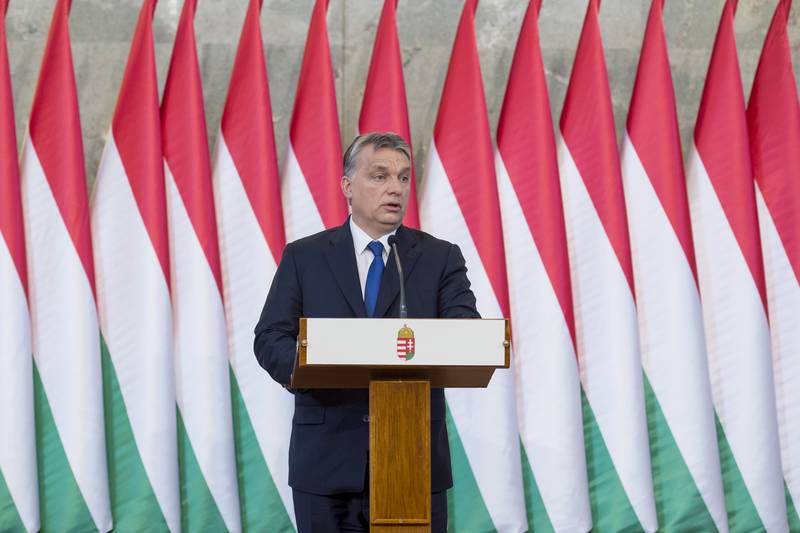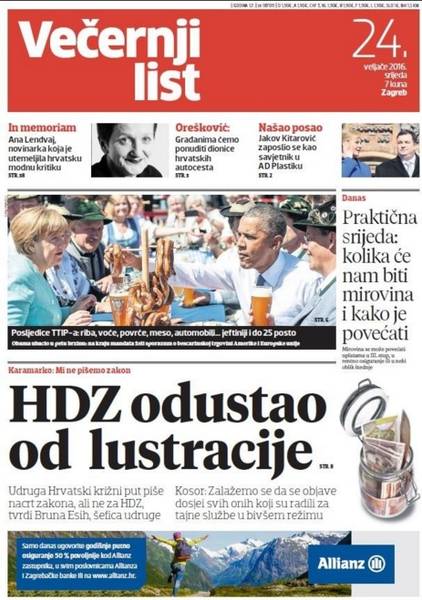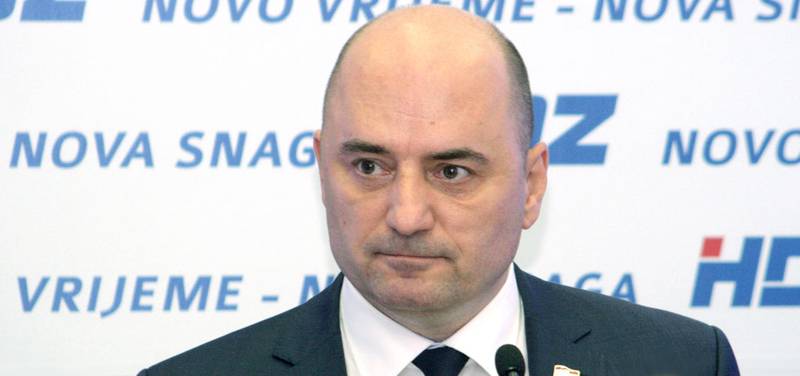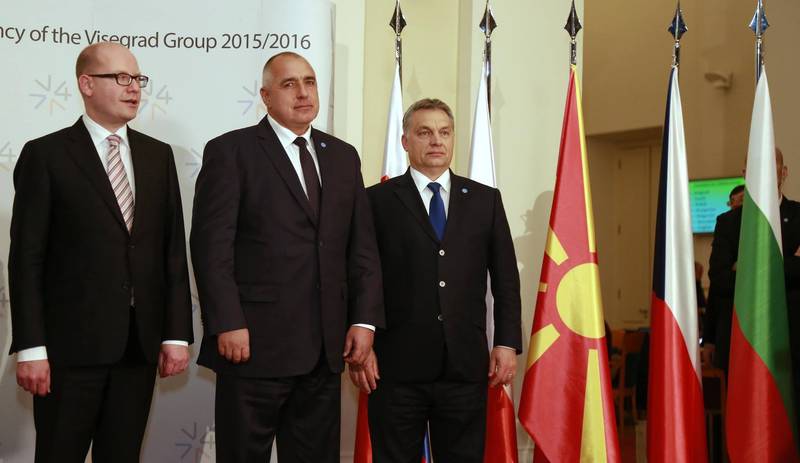Winter Is Coming to the EU
Adelina Marini, March 1, 2016
 If you want to stall the EU, organise a referendum. It does not matter what it is about, as long as it is against the EU. Mere hours after the weary European leaders shook hands with British Prime Minister David Cameron on transforming the special relations between Great Britain and the EU into more special ones, there came a signal from the Central-European Great Britain, as Polish analyst Konstanty Gebert named the Czech Republic, that it is possible this country too will put its Union membership to the people’s vote. Czech Prime Minister Bohuslav Sobotka was quoted saying at the beginning of last week that “Debates about leaving the EU could be expected in this country in a few years, too, if Britain left the EU”. Very soon after that the Hungarian PM decided there was an opening for him to strike at the EU.
If you want to stall the EU, organise a referendum. It does not matter what it is about, as long as it is against the EU. Mere hours after the weary European leaders shook hands with British Prime Minister David Cameron on transforming the special relations between Great Britain and the EU into more special ones, there came a signal from the Central-European Great Britain, as Polish analyst Konstanty Gebert named the Czech Republic, that it is possible this country too will put its Union membership to the people’s vote. Czech Prime Minister Bohuslav Sobotka was quoted saying at the beginning of last week that “Debates about leaving the EU could be expected in this country in a few years, too, if Britain left the EU”. Very soon after that the Hungarian PM decided there was an opening for him to strike at the EU.
Unlike his Czech colleague, Viktor Orbán did not hesitate one bit and straight out announced his intention to have a referendum on the mandatory quotas for refugees, while at the same time hinting at the membership issue. “We, Hungarians, believe — and I am convinced that the government was yielding to the general desire of the public when it chose to call a referendum — that introducing compulsory resettlement quotas without the consent of the people is nothing less than an abuse of power. Therefore we shall ask the people of Hungary about this question, just as we asked them about Hungary’s accession to the European Union”, said Orbán facing the Hungarian parliament last week.
This was another infatuation with the referendum-mania that has been shaking the EU for some time now. Soon there will be a referendum in The Netherlands as well, which needs to approve or discard the association agreement with the Ukraine, which was the reason behind the war in the country.
Besides creating a feeding ground for plebiscites, the British referendum has another blocking effect to the EU. As Politico Europe reported last week, legislative action in the EU will practically freeze, expecting the results of the British referendum on June 23rd. euinside spoke to European Parliament representatives, who feel there really is a standstill expected on key European draft legislation in fear that they could affect moods in Great Britain, which are totally polarised anyway. All European institutions will participate in the legislative standstill – the Commission, Parliament, and the Council will use procedural tricks to stall the legislation packages.
Additional cool in the already rigid European Union was brought by the PM of the newest candidate state for membership in the EU – Serbia – Aleksandar Vučić . On February 22nd, during the Western Balkans summit of the European Bank for Reconstruction and Development (EBRD), he stated that the EU had lost its magic power. “This is no longer the beautiful dream it used to be”, he said [in Serbian], announcing at the same time that nationalistic tensions in the Western Balkans were growing. The refugee crisis is serving as a litmus test for these attitudes. The cherry on the ice-cream cake was the meeting, organised by Austria, with the six countries of the Western Balkans refugee route, where Bulgaria was invited as an “observer”. The absence of Greece and Germany played the role of another frigid wind blowing over the EU.
Here lustration, there lustration
The week between February 22 and 28 was pretty busy for Croatia. The news, which excited many in Bulgaria the previous week that Croatia was preparing a bill for lustration, was disproved as soon as the beginning of the next week. It turned out that such an idea is still too distant. If it ever gets to that, there will be a wide public discussion held as it became clear from statements of official Croatian representatives. Meanwhile, it became clear that the main coalition partner in the government – the Patriotic coalition – have very poor luck with the candidates for minister of war veterans. After the grand scandal that unfolded mere days after the new government took office and following the prolonged search for a successor of the resigned Mijo Crnoja, the Croatian  Democratic Union (HDZ) of First Deputy Prime Minister Tomislav Karamarko finally came out with a proposal that the first secretary of the party Milijan Brkić be appointed for this post.
Democratic Union (HDZ) of First Deputy Prime Minister Tomislav Karamarko finally came out with a proposal that the first secretary of the party Milijan Brkić be appointed for this post.
The problem is that he is a plagiarist. He plagiarised over 70% of his graduation thesis for the police academy. The scandal unfolded back in 2013, but the court then decided to give him back his diploma. Over the last week, however, the news was central to all media in Croatia and prompted some very sharp comments. Such was the comment [in Croatian] of Goran Vojković in the left-oriented website Index. “Plagiarism means decorating yourself with someone else’s brain, someone else’s labour, it means getting to a mark and a degree in a way, which is not deserved, which is not honest, and which will not result in knowledge, but just paper”, wrote Vojković. The scandal remained unresolved last week too. Brkić’s nomination was never put for discussion in the agenda of the government as expected. This was another scandal in a row of scandals, linked to the right-wing political power HDZ, breeding doubts as to whether the party really purged itself of dishonesty after the row of corruption scandals during their previous periods in power, culminating in the imprisonment of the party leader and prime minister at the time Ivo Sanader.
Last week, the foreign affairs priorities of Croatia were laid out by Foreign Minister Miro Kovač. The minister’s aim is to position Croatia as an active and independent member of the EU, which includes “vertical cooperation” with the friends in Central and Mediterranean Europe and “horizontal cooperation” with “the friends in South-Eastern Europe and beyond”. His first visits showed he is already working in that direction. His first visit after assuming office was to Bosnia and Herzegovina, then Montenegro and Germany, last week he was in Italy and the Vatican. Regarding the refugee crisis, the minister said that work needed to be done actively with the countries, which are most exposed to the migration wave. He feels, however, that it is important for a European answer to be found to this issue and avoid unilateral initiatives. This did not get in the way of Croatia participating in the meeting, organised by Austria, where the two most important countries in the migrant crisis were absent – the point of entrance (Greece) and the destination (Germany).
There were also developments in the case of the desire for the change of the director of the Croatian Radio and Television (HRT) last week. The Director General of the European Broadcasting Union Ingrid Deltenre sent a letter to PM Tihomir Orešković and to Sabor Speaker Željko Reiner, in which she expressed her concern about the announced threats to the editorial and institutional independence of the HRT, as well as about the increased political pressure that the HRT management is subjected to. According to Croatian experts, however, the political pressure on the public television, which is mainly supported by direct payments by viewers, is not a new phenomenon. According to them, the bomb was planted in the law  for radio and television, which is in need of a total overhaul. Only it is not too-probable that this will round-up the necessary intra-party consensus.
for radio and television, which is in need of a total overhaul. Only it is not too-probable that this will round-up the necessary intra-party consensus.
The star on the Croatian political scene last week again was Finance Minister Zdravko Marić, who reinstated the dialogue with unions and presented the guidelines of the budget that is supposed to be drafted by March 10th. This will be one of the biggest challenges to the scandal-torn and accused of incompetence government of Tihomir Orešković. The minister will have to produce a budget, which will work for lowering the excessive budget deficit and fast-growing public debt, while this will not be at the expense of economic growth, which Croatia has experienced for the first time in six years.
Serbia between a rock and a hard place
The EU might have lost its charm to Serbian PM Aleksandar Vučić, but to others in Serbia the Union is a downright invader. This became evident during a lecture of the boss of the EU’s delegation in Serbia, Michael Davenport, on February 24th in the Faculty of Political Sciences. He was met by boos and chants of “Occupation is not democracy, we are forced by you”. His reply: “It is your choice, a choice that Serbia has”, reported [in Serbian] the Serbian Blic. Meanwhile, from Moscow came some “friendly” pressure. In the midst of the preparations for Russian PM Dmitry Medvedev’s visit to Belgrade, there came a stiff warning from the Russian foreign ministry that Russia must receive the same privileges that NATO did. “Before the visit of Russian Prime Minister Dmitry Medvedev, a crucial decision needs to be made whether to give the Russian humanitarian-rescue centre in Niš the same rights as to NATO and thus threaten the road to the EU”, wrote Serbian agency Tanjug.
NATO employees were granted diplomatic immunity by law and are freed from taxes and tariffs. It is believed that if Russia receives the same privileges for the centre in Niš, it will prove Serbia’s military neutrality that has been stated repeatedly by PM Aleksandar Vučić. According to Russian foreign ministry spokesperson Maria Zaharova, quoted by Tanjug, “it is a special kind of humiliation, an attempt to create a Stockholm syndrome by forcing the victim to love you and publicly state it wants to be with you”.
The magic of the EU with its myriad of requirements and problems is already turning into rather a nightmare for Serbia. After receiving heavy criticism the week before last from the Hague International Criminal Tribunal for the former Yugoslavia for failing to turn over three members of the Serbian Radical Party to court, official Belgrade sent a sharp reply last week: “We will fulfil our obligations without threatening the obligations of the state, or threatening what is most precious at the moment, namely peace and stability, lowering of tensions. All this came totally surprising and unexpected to us, for we have been aware since January 19th of the existence of such an arrest warrant, but all was under the sign of confidentiality. All of a sudden this status is revoked and details are being reported”, said Rasim Ljajić, president of the National Council for Cooperation with the Hague Tribunal, quoted [in Serbian] by the national television RTS.
Better call the janitors
Bulgaria has been shaking last week as well from hard to work out scandals. The week began with complaints by PM Boyko Borissov and the oligarch Delyan Peevski about having received death threats. The Prime Minister explained that he received a bullet in an envelope, but there were many ambiguities left about the case, same as with the Delyan Peevski one. There were comments in the Bulgarian public domain that this was possibly a form of disgusting PR. Meanwhile, another case proved how essential janitors were to the state. After the previous week the PM had a talk with the janitors of Sofia airport through Skype from the summit in Brussels, it became clear last week that a janitor from the Sofia Investigation Agency threw away documents on the Corporate Commercial Bank bankruptcy case with the garbage.
At all this background, the statement of the Dutch ambassador to Sofia was quite sobering. In an interview [in Bulgarian] for bTV he said that Bulgaria had no chances of entering Schengen or having the Cooperation and Verification Mechanism removed. “Until we can fully trust the other’s judiciary, we have no reason to abolish the internal borders between us. This is why, we believe that it is not the time to abolish our borders in  Bulgaria. We think that Bulgaria is not ready to enter Schengen”, said Ambassador Tom van Oorschot.
Bulgaria. We think that Bulgaria is not ready to enter Schengen”, said Ambassador Tom van Oorschot.
In the geopolitical aspect, the past week was also quite tense for Bulgaria. The diplomatic conflict with Turkey continued to grow after Ankara declared First Secretary of the Bulgarian General Consulate in Istanbul Zornitsa Apostolova a persona non grata in the country. This came as a reply to Bulgaria’s decision to ask for the recall of the attaché in the Turkish General Consulate in Burgas, Ugur Emiroglu, because of his religious activity in Bulgaria.
The less EU, the more Western Balkans problems
The loss of the European magic is very strongly felt in the Western Balkans region, where everything is again in turmoil and Russia is fighting all in to secure a strong influence. Last week ended with the election of Hashim Thaçi for president of Kosovo amid another episode of gassing in the Kosovar parliament. In neighbouring Bosnia and Herzegovina, on the other hand, the leader of Republika Srpska Milorad Dodik announced that he wanted an ever closer relations with Serbia, for it had proved itself as a guarantor of stability in the region. Furthermore, he announced that Republika Srpska was trying to protect itself from the Ustašianism and Osmanism, which are dominating in the Dayton federation currently. Montenegro, which is most advanced of all candidate countries in the region on its European way, is being torn by pro-Russian raids.
The Democratic front organised yet another rally with demands for a change of government. At the rally, one could see Serbian flags, flags of the Serbian Radical Party of Vojislav Šešelj, and in preparation for the rally special T-shirts were sent from Moscow bearing the image of Russian President Vladimir Putin. The leader of New Serb Democracy Andrija Mandić announced during the rally that he had just returned from Moscow, calling it “the most important international address” at this moment, reported the Montenegrin state TV channel. The game with Macedonia against Greece also has a strong destabilising effect on the region with the potential of introducing more tension in the EU itself.
Translated by Stanimir Stoev
 Federica Mogherini | © Council of the EU
Federica Mogherini | © Council of the EU | © Council of the EU
| © Council of the EU Luis De Guindos | © Council of the EU
Luis De Guindos | © Council of the EU Kolinda Grabar-Kitarovic | © KGK
Kolinda Grabar-Kitarovic | © KGK Jozo Rados | © European Parliament
Jozo Rados | © European Parliament Aleksandar Vucic, Andrej Plenkovic | © Vlada RH
Aleksandar Vucic, Andrej Plenkovic | © Vlada RH